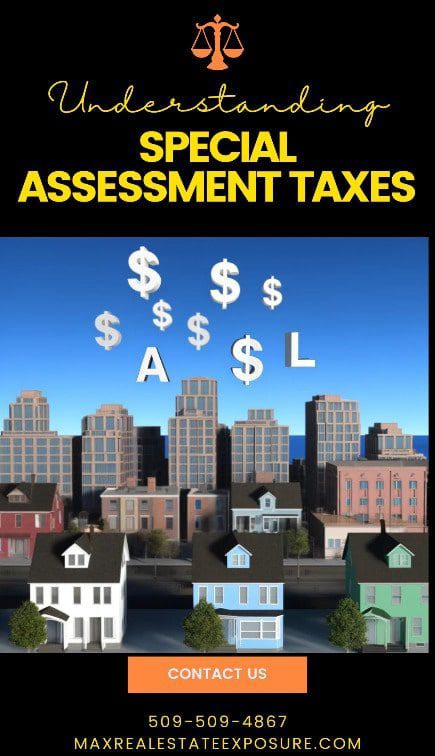 Special assessment taxes are crucial financial tools local governments use to fund specific public improvements that directly benefit particular properties.
Special assessment taxes are crucial financial tools local governments use to fund specific public improvements that directly benefit particular properties.
I will provide the definition, process, and implications of these taxes. You will learn essential insights into how these levies affect their real estate investments.
We will explore examples of such taxes, why they are imposed, their duration, financial impacts, the conditions under which they are deductible, and how they can be managed during property transactions.
As a long-standing real estate agent and homeowner, I have dealt with special assessment taxes for the past three decades.
Understanding their short- and long-term impact is crucial whether you are a buyer or seller.
It is essential to understand that they should not be confused with a special condo assessment, which is entirely different.
Let’s examine everything you should know.
Quick Facts to Know
1. A special assessment tax is a fee for property owners to fund specific public projects or improvements.
2. A local government or municipality typically levies it.
3. Special assessment taxes aim to distribute the project’s cost among the property owners who will directly benefit from it. This can be called the special assessment district.
4. Examples of projects that may be funded through a special tax assessment include road repairs, sidewalk construction, and street lighting upgrades.
5. The amount of the tax is often based on factors such as the property size or its proximity to the project.
Definition of Special Assessment Tax
A special assessment tax is levied on property owners to fund public projects that increase the value of their properties. This tax differs from general property taxes, which fund services benefiting the entire community, such as education and police protection.
Special assessment taxes are levied for enhancements like sidewalks, street lights, or sewer systems, directly impacting the surrounding properties.
Examples and Reasons for Levying
Here are some prime examples of a tax for special assessments on infrastructure projects.
- Street Paving: Enhances road safety and accessibility, increasing property desirability and value.
- Sewer Improvements: Directly affects health standards and property functionality, leading to better living conditions.
- Street Lighting: Increases safety and security, making the neighborhood attractive to current and potential residents.
- Recreational projects: Examples include baseball fields, tennis courts, building trails, and parks.
- Public safety projects: This could include several items, including lighting, sidewalks, signage, and more.
Special assessment taxes ensure that those who benefit directly from public improvements pay for them. This fair and efficient approach allows for the direct association between the funded improvements and the beneficiaries.
It also ensures that funding for significant local projects is available without burdening the wider community. Otherwise, community members would want to appeal the higher property taxes if they were not receiving any benefits.
The city or town will collect the funds from appropriate homeowners.
The Process of Levying Special Assessment Taxes
The process typically follows several vital steps:
- Proposal: Local governments propose improvements after identifying a need.
- Assessment: Specialists determine which properties will benefit and estimate the cost implications.
- Notification: Property owners are informed about the potential tax through official notices.
- Public Hearing: homeowners can participate in hearings where they can support or object to the tax.
- Approval and Implementation: Following approval, the project commences, and the tax is levied on the benefitting properties.
Duration of an Assessment Tax
The duration of these taxes is usually linked to the period required to pay back any debts incurred to finance the project, such as bonds. Depending on the project’s scale and the financing structure, this period can range from a few years to decades.
Financial Impact on Property Owners
Thinking about taxes can have negative connotations on the surface. That is not necessarily the case in this instance.
Increased Property Values
Property improvements like better roads and new infrastructure can significantly enhance a property’s market value and attractiveness, making it more appealing to potential buyers.
I remember the roads were awful years ago in one of the communities where I sold homes. When mentioning the town, it had a terrible reputation since the streets were in rigid shape. You would be playing Russian Roulette, trying to dodge all the potholes.
Eventually, the roads were addressed, and that negative connotation was removed.
The Initial Cost Can Be High
While the initial cost can be substantial, these taxes often increase property values, potentially offsetting the initial financial burden over time.
Are There Any Exemptions?
It is possible you could qualify for an exemption from a special tax assessment based on your age or disability. Speak to your local town hall to get answers to this question.
Deductibility of a Special Tax Assessment
Generally, special assessment taxes for capital improvements are not deductible on federal income taxes. However, property owners can deduct these expenses if the tax is levied for maintenance or repairs.
I recommend you consult with a tax advisor to understand specific deductible conditions.
Appealing These Taxes
Property owners can challenge the assessment if they believe it is unfair:
- Review the Assessment Details: Ensuring the cost and project details are accurate. I recommend getting help if you’re unclear on what is being proposed.
- Participate in public hearings: I always advise engaging in the process of voicing any disagreements.
- Formal Appeal: If warranted, you can use formal channels to contest the tax assessment. Your local government will have procedures on how this is done.
Managing Special Assessment Taxes During Property Transactions
 It’s crucial to handle these taxes carefully during property transactions:
It’s crucial to handle these taxes carefully during property transactions:
- Disclosure: Sellers should disclose any ongoing or future assessments to potential buyers. As someone with many years of experience selling homes, this will be crucial for buyers to know upfront. Not disclosing an item like this with such a financial impact could cause a buyer to back out.
- Negotiation: Parties can negotiate who will bear the costs of the assessment. How this works will depend on where you’re located regarding payment. I have seen it work both ways. Betterments are often assumable.
- Escrow: Utilizing escrow accounts can help manage the payment of these taxes effectively during the transition of property ownership.
Paul Sian, a top real estate agent at United Real Estate Home Connections, provided valuable insights on disclosing these taxes.
While property tax increases are regular, special tax assessments are not typical. A real estate agent representing a home seller must be upfront with buyers about these assessments.
A tax like this could be a painful surprise to the new owners, as their budget may no longer be able to handle the house payments, including taxes. Real estate agents must be upfront with buyers and inform them about community improvements that can boost a home’s taxes.
What Are Special Assessment Liens?
Your state or local government imposes a special tax as an assessment lien with a low interest rate on every home or property tax bill.
Before purchasing a home, obtaining an official assessment search or municipal lien request from your local government is crucial, as well as gaining a comprehensive understanding of the assessment role.
Knowing that an unpaid assessment could exist on a property is essential. This ensures that the new owners are informed about any outstanding evaluations on the property.
Liens serve as legal instruments that safeguard the interests of local governments by guaranteeing that property owners fulfill their special assessments. When a lien is in place, the entity possesses a legal right to the property.
Conclusion
Special assessment taxes are essential for funding specific public improvements benefiting certain properties. Understanding these taxes can help property owners manage their financial obligations effectively. Homeowners can capitalize on the benefits provided by the funded projects.
Knowledge of the appeal process and the tax’s implications during property transactions is vital to avoid disputes and ensure smooth financial transitions.
Don’t hesitate to contact me if I can answer any questions on special assessment taxes. I will do my best to provide property owners with a comprehensive understanding of these levies.
About the Author: Bill Gassett, a nationally recognized leader in his field, provided the above real estate information on what a special tax assessment is and how it works. Bill has expertise in mortgages, financing, moving, home improvement, and general real estate.
Learn more about Bill Gassett and the publications in which he has been featured. Bill can be reached via email at billgassett@remaxexec.com or by phone at 508-625-0191. For the past 38+ years, Bill has helped people move in and out of Metrowest towns.
Are you thinking of selling your home? I am passionate about real estate and love sharing my marketing expertise!
I service Real Estate Sales in the following Metrowest MA towns: Ashland, Bellingham, Douglas, Framingham, Franklin, Grafton, Holliston, Hopkinton, Hopedale, Medway, Mendon, Milford, Millbury, Millville, Natick, Northborough, Northbridge, Shrewsbury, Southborough, Sutton, Wayland, Westborough, Whitinsville, Worcester, Upton, and Uxbridge Massachusetts.

